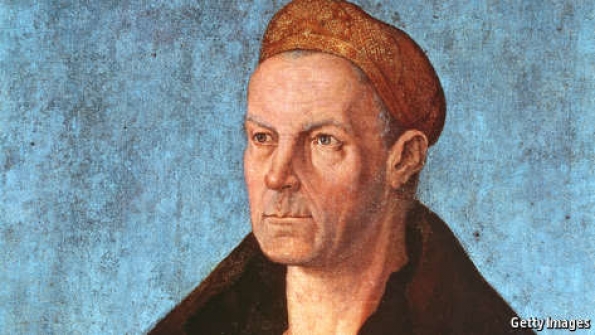I've been meaning, for years, to do a post on the Fugger newsletters that Jacob's kids put together and which some have called the beginning of financial journalism but which really aren't but which are an amazing read anyway, but I still haven't gotten around to it.
No (more) buts about it, I'll pull something together by next week.
From The Economist:

The Richest Man Who Ever Lived: The Life and Times of Jacob Fugger. By Greg Steinmetz. Simon and Schuster; 283 pages; $27.95.
ALBRECHT DÜRER’S portrait of Jacob Fugger shows a man with thin lips and unforgiving eyes. He wears a fine fur tippet about his shoulders and a brown cap; for the time, his dress is strikingly plain. Greg Steinmetz, formerly a journalist with the Wall Street Journal and now a securities analyst in New York, declares that he was the most influential businessman who ever lived. He makes a better case for this extravagant claim than for his assertion that Fugger was also the richest man in history.
A late-medieval banker from Augsburg in southern Germany, Fugger has never been as celebrated as Cosimo de Medici and his Florentine sons and cousins, whose reputation as bankers was burnished by their excellent taste in Renaissance art. But Fugger was the better banker. Were he alive today, he would have cut a swathe through Wall Street and the City, and yet his remarkable history is still little known. Mr Steinmetz’s prose does not always sparkle and some arcane details of banking history are fuzzy, but the tale of Fugger’s aspiration, ruthlessness and greed is riveting.That "Richest Man..." bit is probably not the case with Mali's Mansa Musa being a strong contender for the title. On Musa's 1324 pilgrimage to Mecca he handed out so much gold he crashed Cairo's gold market.
He was born into a family of well-to-do textile traders and bankers in Augsburg in 1459. He grew rich and powerful by risking his capital and his reputation to finance the territorial ambitions of the Habsburgs. Jacob relished the relationship, which began when Frederick III, the Holy Roman Emperor, was given a loan by Fugger’s brother in spite of a dreadful credit rating. Jacob became principal banker to his son, Emperor Maximilian I, who established the Austro-Hungarian Empire, and to Charles V of Spain, whose victory at the Battle of Pavia entrenched the Habsburgs’ hegemony. His huge loans were backed by collateral, and his Habsburg clients frequently paid them off in kind rather than cash.
Fugger was able to obtain control of commodities such as silver, from Austria, and copper, from Hungary. He built a smelter to refine the copper and traded it himself quite pitilessly. When he joined a cartel of copper producers in Venice they agreed to push up the price by squeezing the supply, but Fugger put pressure on his co-conspirators and rivals instead.
He flooded the market with so much metal that the price collapsed and his competitors were gravely weakened. Subsequently, he helped finance a Portuguese scheme to relocate the pepper and spice trade to Lisbon, a move so successful that it delivered a fatal blow to the commercial stature of Venice. He also had a thirst for information about trade and commerce that led him to create a network of couriers whose reports to Augsburg were printed and distributed to clients in the form of a primitive newspaper. Fugger had invented the world’s first news service.
The financier raised fresh capital for his bank by exploiting savings accounts, which were first introduced in Augsburg and paid 5% a year, thus contravening the Catholic church’s ban on usury. Fugger took his argument directly to Pope Leo X (a Medici, incidentally), who had personally benefited from his largesse. The pope was sympathetic and the ban on usury was conveniently rewritten in 1515, when the process was redefined as “a profit that is acquired without labour, cost or risk”....MORE
The thing Fugger had was the influence his money bought.
And the money, of course.